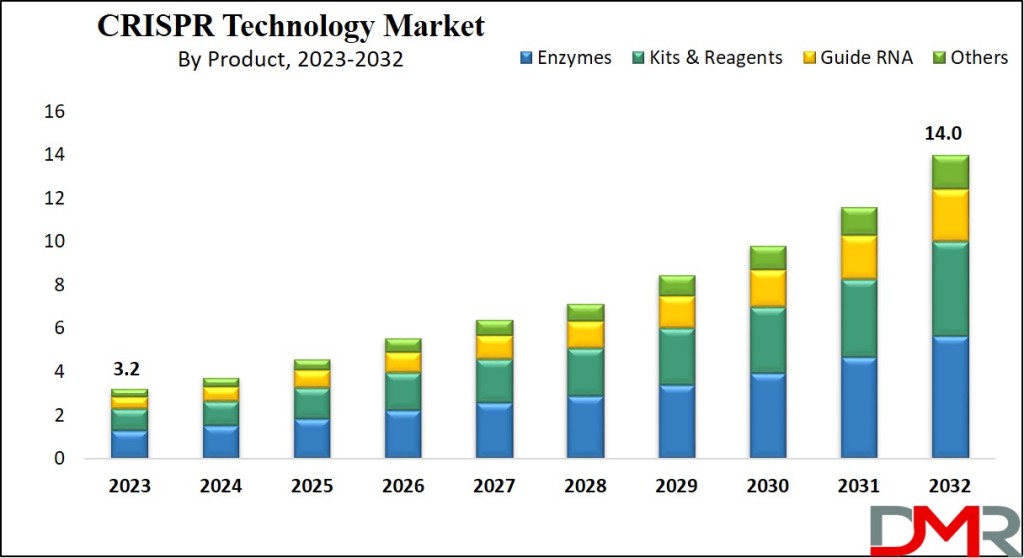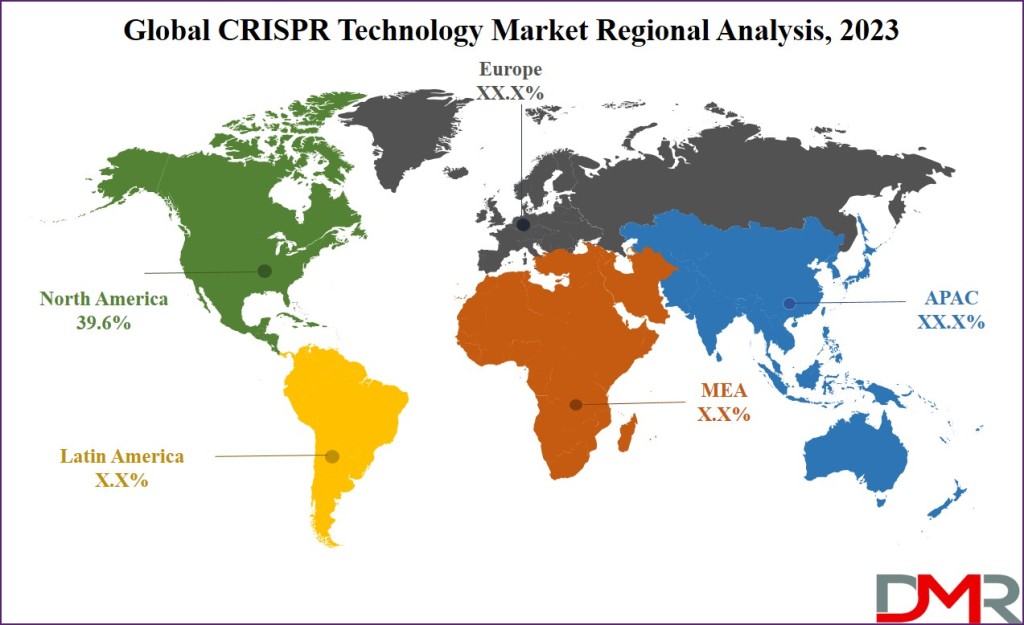CRISPR Technology Market Unveiling the Potential: Exploring the Market
Introduction
In recent years, the CRISPR technology market has surged, propelled by remarkable advancements in gene editing techniques. CRISPR, which stands for Clustered Regularly Interspaced Short Palindromic Repeats, has revolutionized biotechnology by enabling precise modifications to DNA sequences. Initially observed as a bacterial defense mechanism against viruses, CRISPR has now transcended its origins to become a pivotal tool in various sectors, including healthcare, agriculture, and industry. In this comprehensive exploration, we delve into the dynamics, applications, and future prospects of the CRISPR Technology Market.

Market Overview
The Global CRISPR Technology Market is poised for exponential growth, projected to attain a value of USD 3.2 billion by 2023, with estimations soaring to USD 14.0 billion by 2032, reflecting a robust Compound Annual Growth Rate (CAGR) of 17.8%. This meteoric rise underscores the immense potential and increasing adoption of CRISPR technology across diverse industries.
Get a Totally Free PDF Sample Copy Here@ https://dimensionmarketresearch.com/report/crispr-technology-market/request-sample
Key Takeaways
- CRISPR technology market poised for exponential growth, driven by advancements in therapy development and agricultural applications.
- Regulatory frameworks play a crucial role in ensuring responsible implementation and ethical use of CRISPR technology.
- Collaboration between stakeholders fosters innovation and accelerates the pace of research in CRISPR technology.
- Ongoing technological innovations enhance the efficiency and expand the scope of CRISPR applications across various industries.
- Commercialization efforts drive market growth and improve accessibility to CRISPR-based products and services.
- Public awareness and education initiatives are essential for fostering understanding and acceptance of CRISPR technology in society.
- Investment trends reflect confidence in the long-term potential of the CRISPR technology market for addressing critical healthcare and agricultural challenges.
Key Factors
- Technological Advancements
- Regulatory Landscape
- Research and Development Initiatives
- Market Accessibility and Affordability
- Industry Collaborations and Partnerships
- Healthcare and Agricultural Demand
- Public Awareness and Education
- Investment Trends and Funding Opportunities
Targeted Audience
- Biotechnology and Pharmaceutical Companies
- Academic and Research Institutions
- Government Agencies and Regulatory Bodies
- Healthcare Providers and Clinicians
- Agricultural Biotech Companies
- Investors and Venture Capital Firms
- Ethical and Legal Experts
- Consumer Advocacy Groups
Regional Analysis
North America: A Beacon of Innovation
North America commands a substantial share of the CRISPR technology market, owing to its robust biopharmaceutical research and development sector. The region's emphasis on innovation and technological advancement positions it as a key contributor to the global CRISPR landscape.

Asia Pacific: Pioneering Growth
The Asia Pacific region emerges as a burgeoning hub for CRISPR technology, driven by increased investments in research and development. Countries like China and Japan play pivotal roles in shaping the region's growth trajectory, signaling promising prospects for market expansion.
CRISPR Technology: A Game-Changer
Derived from bacteria, CRISPR technology empowers scientists to manipulate genetic material with unparalleled precision. By targeting specific DNA sequences, CRISPR facilitates gene editing, offering unprecedented opportunities in disease treatment, agricultural enhancement, and industrial applications. The multifaceted utility of CRISPR underscores its significance as a transformative force in biotechnology.
Buy This Exclusive Report Here@ https://dimensionmarketresearch.com/checkout/crispr-technology-market
Market Growth Analysis
Market Dynamics
The expansion of the global CRISPR technology market is propelled by widespread adoption and continuous technological advancements. The ability to edit genetic material holds immense promise in combating genetic diseases, thereby driving market growth. However, challenges such as high costs and ethical considerations necessitate concerted efforts to ensure equitable access and responsible utilization of CRISPR technology.
Research Scope and Analysis
By Product
The CRISPR technology market encompasses a diverse array of products, including Enzymes, Kits & Reagents, Guide RNA, and others. Among these, Enzymes emerge as the cornerstone, playing a pivotal role in gene editing applications. Additionally, Kits & Reagents witness significant growth, fostering a deeper understanding and widespread adoption of CRISPR technology.
By Application
Biomedical applications dominate the market landscape, fueled by extensive research and development in gene-editing technologies. The agricultural sector is poised for rapid expansion, leveraging CRISPR technology to enhance crop yields and address global food security challenges.
By End User
Biotechnology & Pharmaceutical companies spearhead market growth, leveraging advanced technologies to drive innovation in drug discovery and therapeutic interventions. The burgeoning biotechnology sector further amplifies demand for CRISPR-based gene-editing techniques, underscoring its pivotal role in shaping the future of healthcare.
Recent Developments (2024)
In 2024, the CRISPR technology market continued to witness significant advancements and developments, shaping its trajectory and impact across various sectors:
- Precision Medicine Breakthroughs (2024): Researchers achieved notable breakthroughs in precision medicine using CRISPR technology, ushering in new treatment modalities for genetic diseases.
- CRISPR-Cas Systems Innovations (2024): Ongoing research led to the discovery and optimization of novel CRISPR-Cas systems, expanding the toolbox for gene editing and enhancing specificity and efficiency.
- Global Regulatory Updates (2024): Regulatory bodies worldwide updated guidelines and regulations governing CRISPR applications, ensuring adherence to ethical standards and safety protocols.
- Emerging Applications in Neurodegenerative Diseases (2024): CRISPR technology showed promise in addressing neurodegenerative disorders, with research focusing on targeted gene therapies and disease modeling.
- Increased Accessibility and Affordability (2024): Efforts to reduce the cost and improve accessibility of CRISPR technologies continued, opening doors for broader adoption in research and clinical settings.
- Expansion of CRISPR-Based Diagnostics (2024): Advancements in CRISPR-based diagnostic tools led to the development of rapid and accurate testing methods for infectious diseases and genetic disorders.
- Strategic Partnerships and Collaborations (2024): Industry players forged strategic partnerships and collaborations to accelerate innovation, product development, and commercialization efforts in the CRISPR technology market.
Competitive Landscape
The CRISPR technology market is characterized by intense competition among major players vying for market dominance. Companies are actively pursuing strategies such as product development and geographical expansion to gain a competitive edge. Notable collaborations and advancements underscore the industry's commitment to driving innovation and addressing critical healthcare needs.
FAQs
1. What is CRISPR technology, and how does it work?
CRISPR technology enables precise editing of DNA sequences, derived from bacterial defense mechanisms against viruses. It employs RNA-guided enzymes to target specific DNA sequences, facilitating precise modifications.
2. What are the primary applications of CRISPR technology?
CRISPR technology finds diverse applications across biomedical research, agriculture, and industrial sectors. It is utilized in disease treatment, crop improvement, and bioproduction processes, among others.
3. What challenges does the CRISPR technology market face?
High costs associated with CRISPR technology pose a significant challenge to market expansion. Ethical considerations surrounding genetic research and accessibility issues further impede growth.
4. Which regions exhibit significant growth potential in the CRISPR technology market?
The Asia Pacific region, particularly China and Japan, showcases immense growth potential driven by increased investments in research and development initiatives.
5. How do biotechnology and pharmaceutical companies contribute to the CRISPR technology market?
Biotechnology and pharmaceutical companies play a pivotal role in driving market growth by leveraging advanced technologies for drug discovery and therapeutic interventions.














